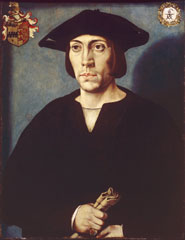“Smuggling has long attracted popular interest,” says Dr Jones. “However, nearly all studies of it rely on records generated by the State. And the problem with those sources are that they only detail the activities of those dumb enough to get caught. My smugglers were rarely that stupid.”
Key to Dr Jones’ study are the business records of Bristol merchants, who engaged in the illicit trade as a normalised part of their business affairs. These accounts detail the minutia of their illegal practices – the bribes paid to customs officers, the strategies used to evade capture, the profits earned.
“ Ten years ago, I found that merchant account books could be used to ‘open a window’ on the illicit trade of past centuries. But once you’ve opened a window on such a world, it’s hard to resist the urge to climb through and go explore. That’s what I did, with the aim of understanding the environment in which my smugglers operated. Beyond that, I also wanted to work out why the trade persisted and why it was so hard to suppress.”
Doing this has, paradoxically, led Dr Jones to sympathise with the smugglers of Tudor England. “The key problem,” he suggests, “is that the regulation and taxation of trade was often so perverse that it was difficult to conduct trade by legal means. State-backed monopolies, prohibitions, price controls and Crown impositions created situations in which it was often impossible to make a profit without breaking the law.”
What really helped the illicit trade to thrive was that the customs service was under-resourced, poorly paid and corrupt. Indeed, the system for appointing customs officers virtually guaranteed their venality. This was because the Crown’s chief officers had to buy their positions from the Lord Treasurer of the Exchequer - the man in charge of the Crown’s finances.
Successive Lord Treasurers, such as the Marquess of Winchester and Lord Burghley, were willing to accept extraordinary sums of money to appoint men to offices in the customs service that paid very little. These bribes went straight into the Lord Treasurer’s pocket, being considered a perk of the job.
“Given the price of the customs offices,” says Dr Jones, “‘the service was only ever likely to attract dishonest applicants, who could hope to make their money back by taking bribes from merchants to allow illicit shipments to pass.”
Contemporaries were not unaware of the corruption of the customs system or indeed of those in charge of it. Sir Walter Raleigh, for instance, once claimed that all three of Elizabeth’s chief ministers were ‘pensioners’ to the chief customs officer of London, who paid the Queen's men thousands of pounds each year to retain his office.
As for the customs officers, they could become very wealthy, despite the huge sums they had to pay to buy their positions. This too was observed by cynical contemporaries. Or, as one noted, ‘it is a marvel to all men how of so small wages or of other duties lawfully belonging to them, they [the customs officers] can justly or honestly...become so rich.’ Given this, it is perhaps unsurprising that a culture developed in which many merchants felt that ‘deceit which is used towards the Prince... be no deceit at all.’
“When I started,” says Dr Jones, “I tended to assume that my merchant-smugglers were just greedy. That is certainly what official statues and proclamations constantly said of them. And it may be that they were greedy. However, when you spend time in their world you come to realise that engagement in the illicit trade was not just about making more money – it was often about survival.”
Inside the Illicit Economy: Reconstructing the Smugglers' Trade of Sixteenth Century Bristol by Evan Jones is published by Ashgate £65

